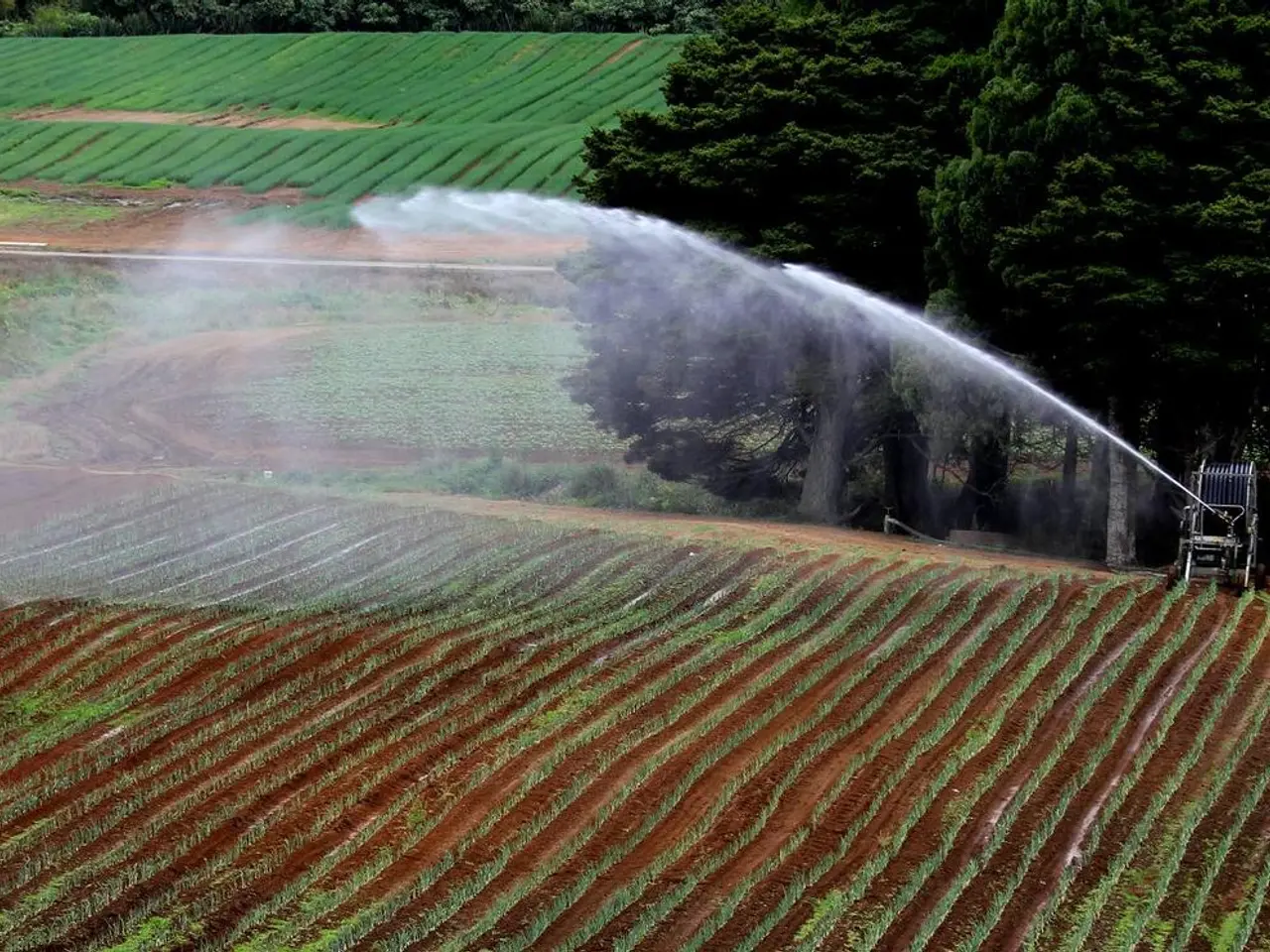Tips for Saving Water in Sustainable Agriculture
Farmers worldwide are turning to sustainable and eco-friendly practices to conserve water resources and maintain soil health. This shift focuses on managing soil moisture, choosing appropriate irrigation systems, and implementing rainwater harvesting.
Soil Moisture Management Techniques
Effective soil management is key to maintaining soil moisture levels. Adding organic matter like compost and well-rotted manure improves soil structure, boosts water retention, and enhances soil health. Hydrogels, water-absorbing polymers, can hold moisture and reduce irrigation frequency. Mulching with organic or inorganic materials regulates soil temperature, reduces evaporation, and conserves moisture.
Cover cropping, growing crops like legumes, grasses, and brassicas between main crops, stabilizes soil, increases organic matter, enhances moisture retention, suppresses weeds, and supports microbial biodiversity. Reduced tillage and minimum soil disturbance preserve soil structure and water infiltration capacity, while continuous organic amendments increase water-holding ability.
Choosing the Right Irrigation System
Drip irrigation, delivering water directly to plant roots, minimizes waste and evaporation, making it highly efficient for conserving groundwater and maximizing plant water use. Sprinkler irrigation, distributing water evenly across fields via pipes and pumps, is efficient for crops needing overhead watering while reducing water loss compared to flood irrigation. Soil moisture sensors help farmers precisely schedule irrigation to apply water only when needed, preventing overwatering and conserving resources.
Rainwater Harvesting Strategies
Collecting and storing rainwater during rainy seasons provides a sustainable, low-cost water source for irrigation during dry periods, reducing reliance on groundwater or external supplies. Structures such as tanks, ponds, or contour trenches can store rainwater effectively, which can then be used to irrigate crops and improve water-use sustainability.
Additional Sustainable Practices
Crop rotation and planting drought-resistant varieties reduce water needs and maintain soil fertility. Agroforestry, integrating trees and shrubs with crops, enhances water retention and ecosystem health.
By employing these techniques, eco-friendly, water-efficient farming is supported, conserving soil moisture, optimizing irrigation application, and harnessing natural rainwater resources. Ultimately, this improves crop productivity and sustainability.
Before using collected rainwater, it's important to check for any debris or contaminants and to clean the gutters and tank regularly for maintenance. Drooping plants may indicate the need for water, while yellow leaves might suggest overwatering. Drip irrigation is beneficial for small gardens or rows as it saves water and delivers water directly to the roots. Soaker hoses are suitable for flower beds or gardens due to their ability to provide even watering and easy setup.
By planting drought-resistant crops like sorghum, millet, and quinoa, farmers can protect their land for future generations and save water resources. Efficient irrigation methods like drip irrigation should be used with drought-resistant crops to save water. Setting up a rainwater collection system involves choosing a collection area, installing gutters and downspouts, selecting a storage tank, connecting the system, and setting up an overflow system. Using drought-resistant crops supports water conservation tips for eco-friendly irrigation practices in farming. Drip irrigation waters the roots directly, reducing water waste.
In the realm of eco-friendly farming, maintaining a sustainable lifestyle is paramount. Soil moisture management techniques such as adding organic matter, using hydrogels, mulching, and cover cropping help keep soil moist and healthy. Efficient irrigation systems like drip irrigation and soil moisture sensors are essential for conserving groundwater and reducing water waste. Rainwater harvesting strategies provide a sustainable source for irrigation during dry periods.
Sustainable practices extend beyond farming. Drought-resistant crops, like sorghum and quinoa, can save water resources while ensuring crop productivity for future generations. In the world of fashion-and-beauty, food-and-drink, home-and-garden, travel, cars, education-and-self-development, casino-and-gambling, and sports, choosing eco-friendly and water-efficient alternatives contributes to overall sustainability. For instance, weather-resistant materials for houses, efficient cooling systems for cars, online learning platforms for education, and rainwater-friendly designs for casinos can all help conserve our precious water resources.




